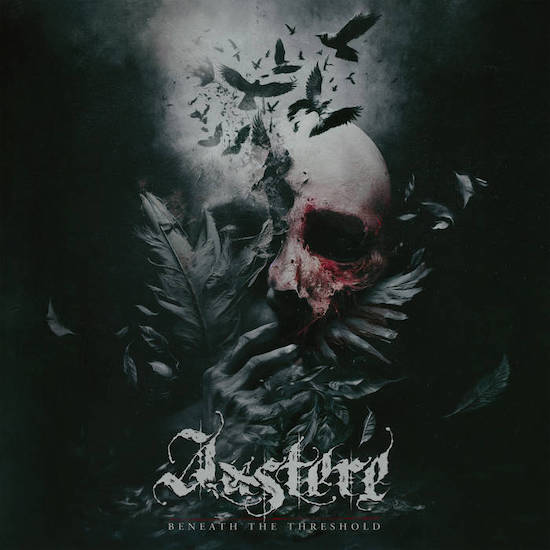
What the hell happened? This collection of new black metal is appearing an hour later than it should have. I finished it at 10:00 and then I looked at an electronic clock and suddenly it was 11:00, without anything happening during that hour.
My first thought was that the music I picked had skewed space-time. The music, as you will see (or rather, hear), is certainly epic enough to cause such an upheaval. But then I discovered the reason was much more stupidly mundane. I gather that on a Sunday next November this column will appear an hour earlier than when I finish it. I look forward to being surprised again. Incipient dementia has its rewards.
AUSTERE (Australia)
Yes, “epic” is an overused and often poorly used word, but even worn-out words still mean something and sometimes are still better than the less-abused alternatives. And yes, “Cold Cerecloth” is epic. It’s also epically infectious.
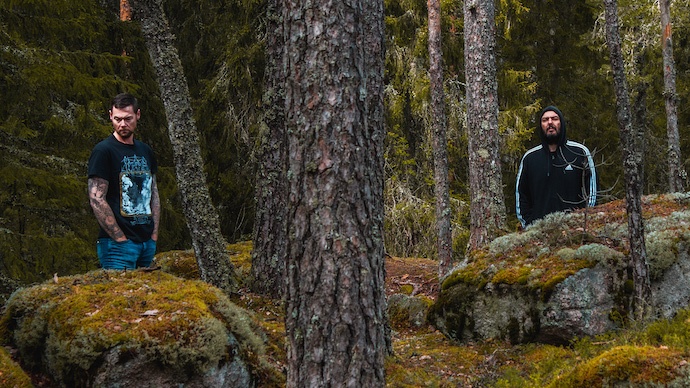
photo by A. Saturnus
If the booming bass-riff in the song doesn’t immediately infect your head I’ll be surprised, especially in harmony with the raking and ringing guitars and the neck-popping snare groove.
But that’s just the attention-grabbing start to a song that features gripping interplay between immolated-goblin snarls and high-flown singing, and between swirling leads and flickering keys at play above the captivating grooves.
The song briefly digresses with dim scratchy notes, as a prelude to a more harrowing denouement of rolling thunder in the low end and glorious waves of sheet lightning in the heavens, and that’s where the song reaches truly epic heights.
Credit once again to the Austere duo of Desolate (aka Mitchell Keepin) and Sorrow (aka Tim Yatras) for this fantastic song. It’s from their fourth album Beneath the Threshold, to be released April 5th by Lupus Lounge (Prophecy Productions).
http://lnk.spkr.media/austere-threshold
https://austere-official.bandcamp.com/album/beneath-the-threshold
https://www.facebook.com/OfficialAustere
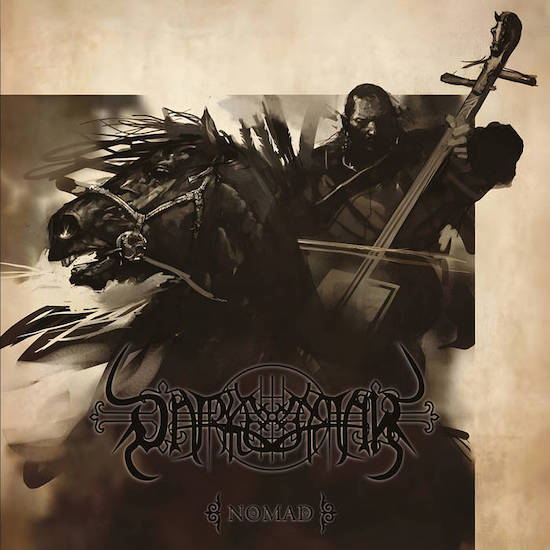
DARKESTRAH (Kyrgyzstan)
One epic song deserves another, and so for the follow-up I’m moving in alphabetical order to the title track from Darkestrah‘s first new album in eight years, which features the work of a revised line-up but no retreat from their brand of “Epic Shamanic Black Metal”.
“Nomad” brings into play old traditional instruments and galloping hooves, but also grim slashing harmonies and galloping drums, as well as the kind of sky-high screaming that puts nerves on edge.
Even with the wail of a flute piercing through and the vibrancy of dancing strings in the music, the song has a dark emotional cast, a beleaguered mood carried by the expanse of slow melodic cascades and marching beats.
About five minutes in, a waltzing folk melody arises along with a bounding beat and fervent singing, and that captivating refrain cycles over and over, again accented by old instruments and vast sounds that seem to stretch to far horizons — yet the music becomes even more sweeping before the end, seeming to channel a fierce determination in the face of daunting odds.
Nomad will be released by Osmose Productions on March 29th.
https://bit.ly/darkestrah-store
https://osmoseproductions.bandcamp.com/album/nomad
https://www.facebook.com/darkestrahofficial
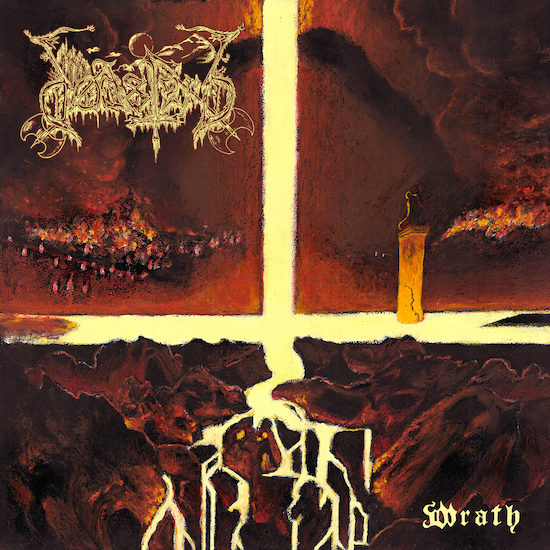
DØDSFERD (Greece)
The next song I’ve chosen is, in a word, really fucking intense. Okay, technically three words. The video that accompanies it is also intense, mainly because most of the footage shows harrowing real-world events in Greece, as well as the real-world performance of Dødsferd in Athens last May.
The riveting intensity of “Restoration of Justice” derives from multiple forces at work together — the fiery, dervish-like whirl of the riffing, the piston-like hammering and rampant blasting of the drums, the scalding ferocity of the vocals. But the electrifying whirl of the melody seamlessly shifts as the song moves, bringing in feelings of dismay and desperation, of sorrow and pain.
In both of these integrated phases, the music is thoroughly immersive, carrying the listener away into both defiant and dark moods, and more changes are to come, with further changes in the emotional timbre of the riffing and the pacing and patterns of the beats.
What doesn’t change is the wholly-consuming nature of the experience, and the unchained blood-spraying fury of the vocals. The riffing is dense yet clear, piercing like gales of fire and swarms of knives, and all of the elaborate melodic motifs have a way of getting stuck in the head as they trade places. And hell yes, the song is epic, as well as harrowing, haunting, and intensely memorable.
“Restoration of Justice” is from Dødsferd‘s upcoming 12th album, Wrath, set for co-release on May 10th by Hypnotic Dirge Records and FYC Records. As the band explain, it stands as “a vigorous indictment of the social and economic consequences of capitalism, political corruption, ecocide, and the largest argument against our civility – warfare.”
https://fycrecords.com/dodsferd
https://dodsferdofficial.bandcamp.com/
https://www.hypnoticdirgerecords.com/
https://hypnoticdirgerecords.bandcamp.com
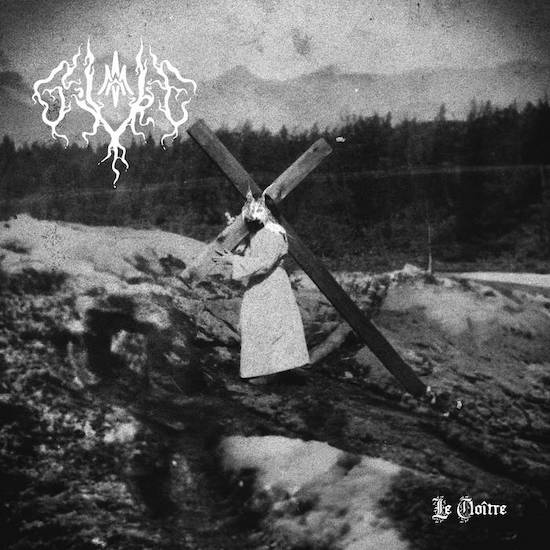
GIVRE (Canada)
Louise de Bellère du Tronchay was a 17th-century French mystic, “renowned for her practices of violent mortifications and her tendency to humiliate herself publicly”. The Eisenwald label provides further information about her, the relevance of which will soon become evident to you:
“Hospitalized in an asylum for women, as her faith is judged to be deranging by her spiritual leaders, she then becomes famous in the ultra-catholic communities of Paris. Among many other things, she ate ash, drank in a skull, tried to get beaten by strangers in the street, and licked the infected wounds of the other woman who lived with her. Louise du Néant translates to “Louise of the Void” or “Louise of the Nothingness”.
“Louise du Néant” is the name of the next song in today’s collection, so now you see the relevance of this obscure piece of history.
I’m well aware that no one needs my words when you can always listen for yourselves in these compilations, but in this case I do think it might help you to know, before you begin, that this song turns into something you may not expect from how it begins.
How it begins is in a hurricane — of inhumanly blasting drums, ear-shredding screams and wild cries, and an instrumental collage that quickly creates a feeling of catastrophic delirium.
But the music undergoes dramatic changes. The hurricane vanishes, and slow strummed chords glitter. Gargantuan and imperious growls take over as the music humongously pounds and rapidly scissors the senses. The screaming delirium ignites again, with a layering of writhing and rapidly roiling guitars piercing the mind and adding to the paroxysmal fevers, along with the demented clang of the bass.
But in the final phase there’s still more… a brazen firestorm, like instrumental wails and sirens gone berserks, and vocals that are even more frighteningly crazed and even more shattering than before. Strangely, it’s almost elegant, but like the elegance of an ornate mirror shattering into razor-like shards.
The song is from the third album by this band from Rouyn Noranda, Québec, named Le Cloître. It is described as follows at Bandcamp:
“With Le Cloître (The Cloister), Givre continues their exploration of the atoning side of pain in Christian history. This time, the lyrics are taken from the hagiographies of six saint women and explores freely their relation to god through suffering, from the symbolic poetry of Hildegard Von Bingen (1098-1179) to the disturbing and factual depictions of Marthe Robin (1902-1981). Musically, this album explores a variety of extreme genres while maintaining a suffocating and tormented atmosphere.
It will be released on March 29th.
https://ffm.bio/givre
https://givremetal.bandcamp.com/album/le-clo-tre
https://store.eisenton.de
https://store.eisenton.com
https://www.facebook.com/givreblackmetal/
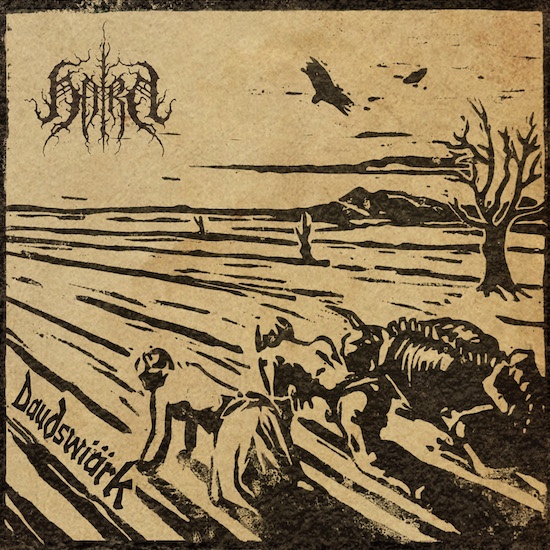
HORN (Germany)
The name of the next song is “Braud“. I’m guessing from the album cover and the record’s subject matter that it might more faithfully be spelled “Brauð”, which is the Old Norse and current Icelandic word for bread. With respect to the subject matter and the art, I’ll share this info from the label:
The album delves into rural life in Westphalia around the turn of the 19th to 20th centuries, exploring themes of agriculture, hunger, illness, and death, while also acknowledging advancements in medicine during that era.
The album’s artwork, a linocut by Timon Kokott, also from Westphalia, portrays a stark landscape of futility against an indomitable will to survive.
As for the music, it’s far heavier and more assaulting than what you might be expecting from the detour Horn took on its last album. The bass is an enormous growling presence; the song packs a bruising punch; and the serrated-edge growls are deep, haughty, and bestial.
On the other hand, the feverish pulse of the riffing is forlorn as well as poisonous, and trilling tones in the high end create a feeling of despair. Also in the high end, sweeping celestial waves, almost like choral voices, create visions of magnificence, albeit visions far beyond the reach of broken grasping hands.
“Braud” is from Horn‘s upcoming album Daudswiärk (“Work of Death”), to be released by Northern Silence Productions on May 3rd.
https://northernsilenceproductions.bandcamp.com/
https://store.northern-silence.de/
https://hornlichterlischt.bandcamp.com/
https://www.facebook.com/hornofficial
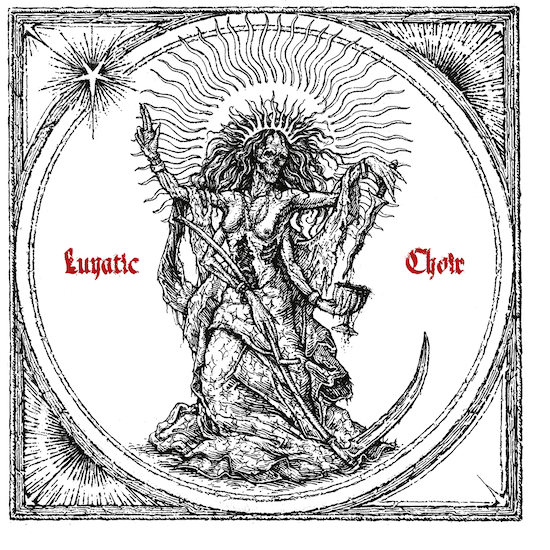
NIGHT SHALL DRAPE US (Finland)
I don’t mean to relegate the music in the next video to an afterthought, but I confess that Mira Leppäsalko‘s performance of Kali in the video is what quickly caught me and rooted me in place for the entirety of the spectacle. Even though the music is itself a spectacle, I had to listen to the song a second time without watching her in order to give it full attention.
When I did that I was able to focus more on the elegant, fleet-fingered riffing and turbocharged drumming, on the glinting acoustic arpeggios and the towering symphonics, on the caustic demon howls and the exotic soloing, on the darkness within the slowly slithering leads… and it proved to be a gripping experience even without the exotic interpretive movements of a very voluptuous Kali.
“The Queen of the Red Streams” is the second single off the debut album from Night Shall Drape Us. The album’s name is Lunatic Choir, and it will be out on April 26th from Season of Mist Underground Activities.
https://shop.season-of-mist.com/list/night-shall-drape-us-lunatic-choir
https://orcd.co/nsdulunaticchoirpresave
https://www.facebook.com/people/Night-Shall-Drape-Us/100088106610327/
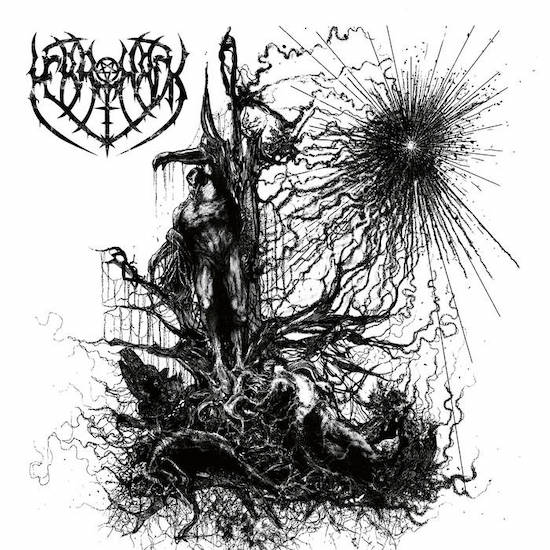
MERRIMACK (France)
As the final item in today’s collection I have Of Grace and Gravity, the new album by Merrimack that hit the streets two days ago via Season of Mist.
On the one hand, I felt a strong sense of obligation to include the album here, because it’s very good, and yet I don’t think anyone else in the NCS cadre was planning to devote a review to it. On the other hand, I haven’t had the time to give it the kind of review I think it deserves.
But again, my words aren’t all that important when you can listen for yourselves, except as a form of strenuous encouragement to do exactly that. So here’s my encouragement!

Prepared with powerhouse production quality, the music within the album is often breathtaking in its towering scale and typhoon-like destructive force, accompanied by shatteringly intense vocals that are undaunted by the sky-spanning and world-devouring instrumental performances around them.
The venerable phrase sturm und drang comes to mind, literally “storm and stress”, because the sweeping keys, detonating drums, and flame-throwing riffs yield to episodes of equal power but whose slowly clanging chords and ringing notes, staggering and ritualistic drums, and wailing melodies create an unmistakably bruised and broken mood, and sometimes yield to even softer moments when lonely guitars weep shining tears. Even the sweeping musical cascades in the stratosphere of these songs can sound like unrequited longing or terrible grief as well as generating visions of apocalypse.
The other old phrase that keeps coming to mind in listening to the album is “larger than life”. Not to say it sounds inhuman (though one wonders about the vocals), because the feelings of rage and ruin in the music are recognizable manifestations of the darkest and most damaged corners of the human heart, but the portrayals are so extravagant and so daunting that they have an archetypal quality, like musical myths of creation and destruction that envision human beings as ephemera in the play of, or caught in the battle between, titanic forces over which they have no control.
There’s a lot to take in here. These seven songs add up to nearly 50 minutes of music. To be sure, there are ebbs as well as flows in speed and intensity, but Merrimack never really climb down the long stairs from the various great monuments of dread, doom, and devastation at whose summits they prefer to dwell. So gird your loins before entering… and don’t think of leaving until the end.
https://merrimack.bandcamp.com/album/of-grace-and-gravity
